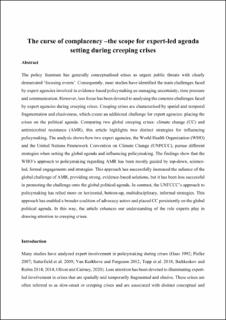| dc.description.abstract | The policy literature has generally conceptualised crises as urgent public threats with clearly demarcated ‘focusing events’. Consequently, most studies have identified the main challenges faced by expert agencies involved in evidence-based policymaking as managing uncertainty, time pressure and communication. However, less focus has been devoted to analysing the concrete challenges faced by expert agencies during creeping crises. Creeping crises are characterised by spatial and temporal fragmentation and elusiveness, which create an additional challenge for expert agencies: placing the crises on the political agenda. Comparing two global creeping crises: climate change (CC) and antimicrobial resistance (AMR), this article highlights two distinct strategies for influencing policymaking. The analysis shows how two expert agencies, the World Health Organization (WHO) and the United Nations Framework Convention on Climate Change (UNFCCC), pursue different strategies when setting the global agenda and influencing policymaking. The findings show that the WHO’s approach to policymaking regarding AMR has been mostly guided by top-down, science-led, formal engagements and strategies. This approach has successfully increased the salience of the global challenge of AMR, providing strong, evidence-based solutions, but it has been less successful in promoting the challenge onto the global political agenda. In contrast, the UNFCCC’s approach to policymaking has relied more on horizontal, bottom-up, multidisciplinary, informal strategies. This approach has enabled a broader coalition of advocacy actors and placed CC persistently on the global political agenda. In this way, the article enhances our understanding of the role experts play in drawing attention to creeping crises. | en_US |
